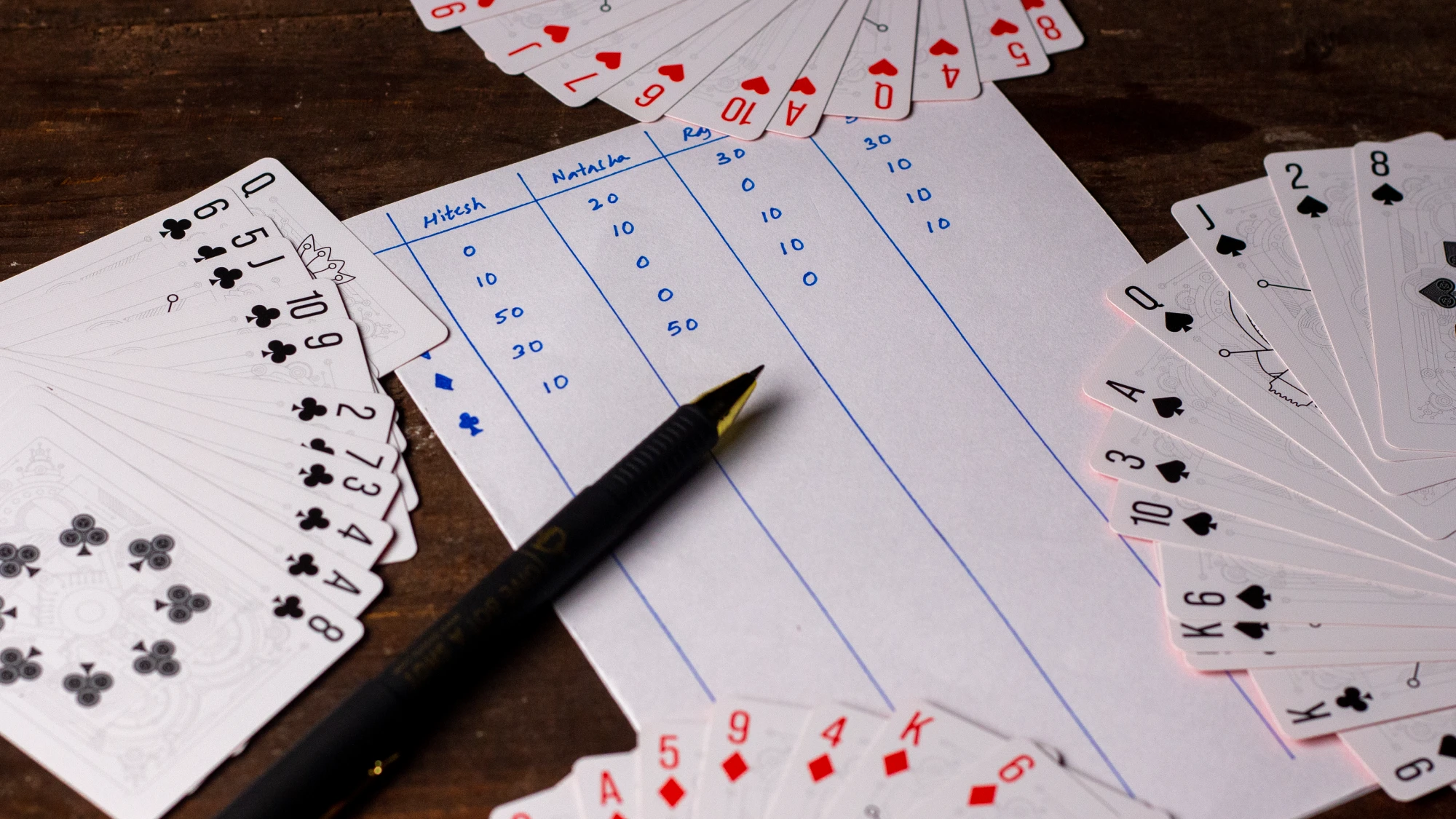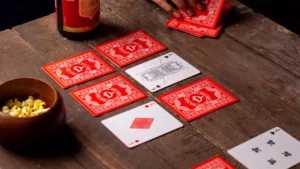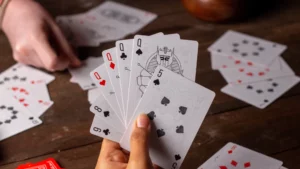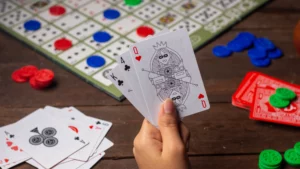Stay tuned and check back often! We’ll be rolling out more exciting card games to keep the fun going.
[/vc_column_text][/vc_column][/vc_row]
December 21, 2024 | BY
SWEATBOX A.K.A. (JUDGEMENT)
[vc_row full_width="stretch_row_content_no_spaces" show_overlay="1" pofo_overlay_opacity="0.6" css=".vc_custom_1735824910632{margin-top: -1em !important;padding-bottom: 2em !important;}" class="heading-bg-title-card-3" pofo_row_overlay_color="#000000"][vc_column width="1/1"][vc_raw_html css=""]JTNDaDIlMjBjbGFzcyUzRCUyMnRpdGxlLWNhdGVnb3JpZXMtY2FyZCUyMiUzRVNXRUFUQk9YJTIwJTNDYnIlM0VBLksuQS4lMjAlMjhKVURHRU1FTlQlMjklM0MlMkZoMiUzRQ==[/vc_raw_html][vc_raw_html css=".vc_custom_1735825870153{margin-bottom: 0px !important;}"]JTNDZGl2JTIwY2xhc3MlM0QlMjJwY3VzdC0xJTIyJTNFJTBBJTNDYSUyMGhyZWYlM0QlMjJodHRwcyUzQSUyRiUyRmJvdHZmeC5jb20lMkZwbGF5aW5nY2FyZHMlMkYlMjIlM0UlMEElM0NidXR0b24lMjBjbGFzcyUzRCUyMmFsbC1ibG9ncy1idG4lMjIlM0VCQUNLJTIwVE8lMjBHQU1FJTIwQ0FURUxPR1VFJTNDJTJGYnV0dG9uJTNFJTBBJTNDJTJGYSUzRSUwQSUzQyUyRmRpdiUzRQ==[/vc_raw_html][/vc_column][/vc_row][vc_row css=".vc_custom_1735315686832{padding-top: 5em !important;padding-bottom: 0px !important;}"][vc_column width="1/6"][/vc_column][vc_column width="2/3"][vc_raw_html css=""]JTNDZGl2JTIwY2xhc3MlM0QlMjJxdW90ZS1oZWFkaW5nLXNlYyUyMiUzRSUwQSUzQ3AlMjBjbGFzcyUzRCUyMmJvdC1xdW90ZS10aXRsZSUyMiUzRVBlcmVzcGlyYXRpb24lMjBpcyUyMGElMjBuYXR1cmFsJTIwYnlwcm9kdWN0JTIwb2YlMjB3b3JraW5nJTIwYXMlMjBhJTIwdmlzdWFsJTIwZWZmZWN0cyUyMHByby4lMjBTbyUyMGNvbXBsZW1lbnQlMjB0aGUlMjBwZXJzcGlyYXRpb24lMjB3aXRoJTIwdGhlJTIwaW5zcGlyYXRpb24lMjBpbiUyMHRoaXMlMjBnYW1lLiUzQyUyRnAlM0UlMEElM0NwJTIwY2xhc3MlM0QlMjJib3QtcXVvdGUtdGl0bGUtMSUyMiUzRUElMjB0cmljay10YWtpbmclMjBnYW1lJTIwd2l0aCUyMHJvb3RzJTIwaW4lMjBJbmRpYW4lMjBjYXJkLXBsYXlpbmclMjB0cmFkaXRpb25zJTJDJTIwaXMlMjBhbGwlMjBhYm91dCUyMGZvcmVzaWdodCUyMGFuZCUyMGNhbGN1bGF0ZWQlMjByaXNrJUUyJTgwJTk0c2tpbGxzJTIwY3J1Y2lhbCUyMHRvJTIwdGhlJTIwd29ybGQlMjBvZiUyMFZGWC4lMjBQcmVkaWN0aW5nJTIwb3V0Y29tZXMlMjBhbmQlMjBwbGFubmluZyUyMGFjdGlvbnMlMjByZWZsZWN0JTIwdGhlJTIwcHJlY2lzaW9uJTIwcmVxdWlyZWQlMjBpbiUyMGNyYWZ0aW5nJTIwYnJlYXRodGFraW5nJTIwbW92aWUlMjBzZXF1ZW5jZXMlMkMlMjBtYWtpbmclMjBKdWRnZW1lbnQlMjBhJTIwdHJ1ZSUyMGdhbWUlMjBvZiUyMG1hc3RlcnkuJTNDJTJGcCUzRSUwQSUzQyUyRmRpdiUzRQ==[/vc_raw_html][/vc_column][vc_column width="1/6"][/vc_column][/vc_row][vc_row id="work" css=".vc_custom_1735280324857{margin-bottom: 0px !important;padding-bottom: 3em !important;}"][vc_column width="1/1"][vc_raw_html css=".vc_custom_1735222337388{margin-bottom: 0px !important;}"]JTNDZGl2JTIwY2xhc3MlM0QlMjJib3QtcG9saW8taGVhZGluZy1nYW1lLTElMjIlM0UlMEElM0NoMiUyMGNsYXNzJTNEJTIyYm90Zm9saW8tdGl0bGUlMjIlM0VIT1clMjBUTyUyMCUzQ3NwYW4lMjBjbGFzcyUzRCUyMnJlZC1jb2xvciUyMiUzRVBMQVklMjBUSEUlMjBHQU1FJTNDJTJGc3BhbiUzRSUzQyUyRmgyJTNFJTBBJTNDJTJGZGl2JTNF[/vc_raw_html][/vc_column][/vc_row][vc_row css=".vc_custom_1735280268811{padding-bottom: 0px !important;}"][vc_column width="1/1"][vc_raw_html css=".vc_custom_1735905742749{margin-bottom: 0px !important;}"]JTNDdGFibGUlMjBjbGFzcyUzRCUyMmdhbWVzLXRhYmxlLWgxJTIyJTNFJTBBJTNDdHIlM0UlMEElM0N0aCUzRU51bWJlciUyMG9mJTIwUGxheWVycyUzQyUyRnRoJTNFJTBBJTNDdGQlM0VUeXBpY2FsbHklMjA0JTIwcGxheWVycyUyQyUyMGJ1dCUyMGNhbiUyMGJlJTIwcGxheWVkJTIwd2l0aCUyMDIlMjB0byUyMDYlMjBwbGF5ZXJzLiUzQyUyRnRkJTNFJTBBJTNDJTJGdHIlM0UlMEElMDklM0N0ciUzRSUwQSUwOSUwOSUzQ3RoJTNFRGVhbGluZyUyMFJ1bGVzJTNDJTJGdGglM0UlMEElMDklMDklM0N0ZCUzRVRoZSUyMGRlYWxlciUyMHNodWZmbGVzJTIwdGhlJTIwZGVjayUyMGFuZCUyMGRlYWxzJTIwYSUyMGZpeGVkJTIwbnVtYmVyJTIwb2YlMjBjYXJkcyUyMHRvJTIwZWFjaCUyMHBsYXllciUyMCUyOHVzdWFsbHklMjAxMyUyMGluJTIwYSUyMDQtcGxheWVyJTIwZ2FtZSUyOS4lM0MlMkZ0ZCUzRSUwQSUwOSUzQyUyRnRyJTNFJTBBJTBBJTA5JTNDdHIlM0UlMEElMDklMDklM0N0aCUzRUdhbWVwbGF5JTNDJTJGdGglM0UlMEElMDklMDklM0N0ZCUzRVBsYXllcnMlMjB0YWtlJTIwdHVybnMlMjBiaWRkaW5nJTIwb24lMjB0aGUlMjBudW1iZXIlMjBvZiUyMHRyaWNrcyUyMHRoZXklMjBiZWxpZXZlJTIwdGhleSUyMGNhbiUyMHdpbi4lMjBBZnRlciUyMGJpZGRpbmclMkMlMjBwbGF5JTIwYmVnaW5zJTIwd2l0aCUyMHRoZSUyMHBsYXllciUyMHdobyUyMGJpZCUyMHRoZSUyMGhpZ2hlc3QuJTBBJTBBSWYlMjBhJTIwcGxheWVyJTIwaGFzJTIwdGhlJTIwc3VpdCUyMHRoYXQlMjBpcyUyMGJlaW5nJTIwcGxheWVkJTJDJTIwdGhlbiUyMGhlJTIwbXVzdCUyMHBsYXklMjB0aGF0JTIwc3VpdC4lMjBJZiUyMHRoZSUyMHBsYXllciUyMGRvZXMlMjBub3QlMjBoYXZlJTIwdGhhdCUyMHN1aXQlMjB0aGVuJTIwaGUlMjBjYW4lMjB1c2UlMjB0aGUlMjB0cnVtcCUyMHRvJTIwZ2V0JTIwdGhlJTIwaGFuZCUyMG9yJTIwJUUyJTgwJTlDZnVzZSVFMiU4MCU5RCUyMG1lYW5pbmclMjBwbGF5JTIwYW55JTIwb3RoZXIlMjBzdWl0JTIwdG8lMjBsZXQlMjBnbyUyMG9mJTIwdGhlJTIwaGFuZC4lM0MlMkZ0ZCUzRSUwQSUwOSUzQyUyRnRyJTNFJTBBJTA5JTNDdHIlM0UlMEElMDklMDklM0N0aCUzRVNjb3JlcyUyMGFuZCUyMFdpbm5pbmclM0MlMkZ0aCUzRSUwQSUwOSUwOSUzQ3RkJTNFUG9pbnRzJTIwYXJlJTIwYXdhcmRlZCUyMGJhc2VkJTIwb24lMjBzdWNjZXNzZnVsJTIwYmlkcyUzQSUyMHR5cGljYWxseSUyQyUyMHBsYXllcnMlMjBlYXJuJTIwMSUyMHBvaW50JTIwZm9yJTIwZWFjaCUyMHRyaWNrJTIwd29uJTIwYW5kJTIwYm9udXMlMjBwb2ludHMlMjBmb3IlMjBmdWxmaWxsaW5nJTIwdGhlaXIlMjBiaWQuJTIwVGhlJTIwcGxheWVyJTIwd2l0aCUyMHRoZSUyMG1vc3QlMjBwb2ludHMlMjBhZnRlciUyMGElMjBwcmVkZXRlcm1pbmVkJTIwbnVtYmVyJTIwb2YlMjByb3VuZHMlMjB3aW5zJTIwdGhlJTIwZ2FtZS4lMjBNaW5vciUyMGluZnJhY3Rpb25zJTIwbWF5JTIwbGVhZCUyMHRvJTIwcG9pbnQlMjBwZW5hbHRpZXMlMjBvciUyMHRoZSUyMHBsYXllciUyMGxvc2luZyUyMHRoZWlyJTIwdHVybi4lM0MlMkZ0ZCUzRSUwQSUwOSUzQyUyRnRyJTNFJTBBJTNDJTJGdGFibGUlM0U=[/vc_raw_html][/vc_column][/vc_row][vc_row class="row-separator-1" css=".vc_custom_1734963366135{padding-top: 3em !important;padding-bottom: 0px !important;}"][vc_column width="1/6"][/vc_column][vc_column width="2/3"][vc_separator css=".vc_custom_1734962966765{padding-top: 1em !important;}"][/vc_column][vc_column width="1/6"][/vc_column][/vc_row][vc_row id="work" css=".vc_custom_1733381920653{padding-bottom: 0px !important;}"][vc_column width="1/1"][vc_raw_html css=""]JTNDZGl2JTIwY2xhc3MlM0QlMjJib3QtcG9saW8taGVhZGluZy1sZWZ0JTIyJTNFJTBBJTNDaDIlMjBjbGFzcyUzRCUyMmJvdGZvbGlvLXRpdGxlJTIyJTNFTU9SRSUzQ3NwYW4lMjBjbGFzcyUzRCUyMnJlZC1jb2xvciUyMiUzRSUyMEdBTUVTJTNDJTJGc3BhbiUzRSUzQyUyRmgyJTNFJTBBJTNDJTJGZGl2JTNF[/vc_raw_html][/vc_column][/vc_row][vc_row class="blog-cards-slider-1" css=".vc_custom_1734947250978{padding-bottom: 0px !important;}"][vc_column width="1/1"][pofo_post_slider pofo_slider_style="post-slider-style-2" pofo_post_preview_image="post-slider-style-2" pofo_post_per_page="20" pofo_show_category="0" autoplay="1" pofo_categories_list="1-player,2-players,2-to-13-players,2-to-6-players,2-to-7-players,2-to-8-players,4-players"][/vc_column][/vc_row][vc_row css=".vc_custom_1735381033691{padding-top: 4em !important;padding-bottom: 0px !important;}" class="bold-text-1"][vc_column width="1/1"][vc_column_text]



